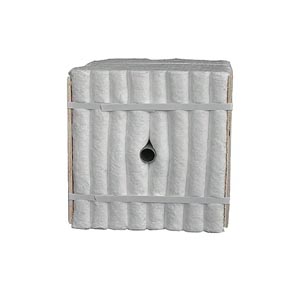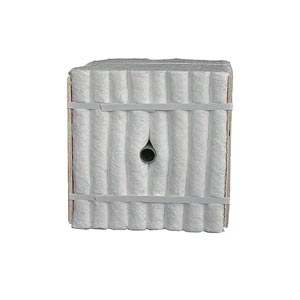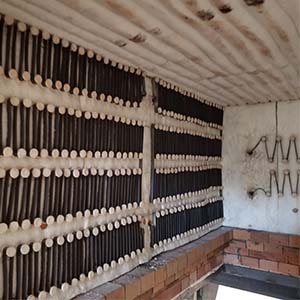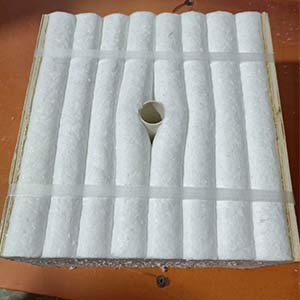Ceramic fiber modules
ceramic fiber module is a pre-fabricated refractory insulation product used in high-temperature industrial applications to line and insulate furnaces, kilns, and other equipment. These modules are constructed using ceramic fiber blanket or felt and are designed to simplify the installation of refractory linings in high-temperature environments.
Ceramic Fiber Insulation: Manufacturing Ceramic module
Modules can be manufactured in various densities, sizes, and temperature ratings. Standard grades are High Purity 2300℉ and Zirconia 2600℉, and are available in thicknesses ranging from 4-12 inches up to 24². Densities range from 8-12 lb/³ and extra high-temperature modules are available that are rated to 3000℉. Please contact us for a custom quote.
Ceramic Fiber modules – Typical Applications
Ceramic fiber modules find application in various high-temperature industrial settings where thermal insulation and refractory linings are essential
Industrial Furnaces and Kilns: Ceramic fiber modules are used to line and insulate industrial furnaces and kilns in industries like steel, aluminum, glass, and ceramics production. They help maintain high temperatures efficiently and reduce heat loss.
Petrochemical Industry: In the petrochemical sector, ceramic fiber modules are used to line and insulate various high-temperature equipment, such as reformers, cracking furnaces, and ethylene crackers.
Heat Treatment Equipment: Ceramic fiber modules are employed in heat treatment furnaces and equipment, ensuring uniform and controlled heating and cooling processes for materials like metals and alloys.
Power Generation: They are used in boilers, combustion chambers, and other components of power generation equipment to improve thermal efficiency and reduce heat loss in power plants.
Glass Manufacturing: Ceramic fiber modules line glass melting furnaces and annealing ovens to maintain high temperatures and ensure consistent and uniform glass production.
Ceramics Production: Ceramic fiber modules are used in the production of ceramics to provide insulation and thermal control in kilns and other high-temperature processes.
Aerospace Industry: In aerospace applications, ceramic fiber modules are used to insulate and line rocket nozzles, heat shields, and other components exposed to extreme temperatures during launch and re-entry.
Automotive: Ceramic fiber modules can be used in automotive manufacturing for applications such as insulating the interiors of heat treatment furnaces used in metal parts production.
Refineries: Refineries use ceramic fiber modules in various high-temperature processes, including fluidized bed reactors, heaters, and cracking units, to enhance energy efficiency and reduce heat loss.
Incinerators: Ceramic fiber modules are employed to insulate and line incinerators, aiding in waste disposal by maintaining high temperatures for efficient combustion.
Foundries: In foundries, these modules line crucibles, ladles, and other high-temperature equipment used in metal casting processes.
Ceramic and Advanced Materials Manufacturing: Ceramic fiber modules are utilized in the production of advanced ceramics and materials, providing insulation and thermal control during sintering and firing processes.
Food Industry: In food processing facilities, ceramic fiber modules may be used in high-temperature ovens and kilns for applications like baking and roasting.
Ceramic Fiber module – Properties
| Type | STD Module | HP Module | HZ Module | |
| Classified Temperature | 1260℃ (2300℉) | 1260℃ (2300℉) | 1430℃ (2606℉) | |
| Working Temperature | 1050℃ (1922℉) | 1100℃ (2012℉) | 1350℃ (2462℉) | |
| Density(kg/m3) | 160-260 (13-16 lb/ft3) | |||
| Linear Shrinkage 24hrs | ≤2.5 1000℃/2012℉ | ≤2.5 1100℃/2012℉ | ≤3.5 1350℃/2462℉ | |
| Thermal Conductivity(W/m.k) | 400℃ (752℉) | 0.09 | 0.101 | 0.118 |
| 500℃ (930℉) | 0.119 | 0.12 | 0.149 | |
| 600℃ (1112℉) | 0.152 | 0.175 | 0.195 | |
| Chemical Composition % | Al2O3 | ≥44 | ≥45 | ≥34 |
| SiO2 | ≥52 | ≥54 | ≥50 | |
| ZrO2 | ≥15 | |||
| Fe2O3 | ≤1.0 | ≤0.5 | ≤0.5 | |
| K2O+Na2O | ≤1.0 | ≤0.2 | ≤0.2 | |
| Size | 300/600*300*200-350 mm | |||
| Packing | plastic bag together with Carton or Pallet | |||
ceramic fiber modules types
Ceramic fiber modules come in various types and configurations to suit different industrial applications and requirements. The specific type of ceramic fiber module you choose depends on factors such as temperature range, installation method, and the shape of the equipment being lined. Here are some common types of ceramic fiber modules
High-Alumina Ceramic Fiber modules:
High-alumina ceramic fiber modules contain a higher alumina content and are suitable for higher-temperature applications, typically up to 2600°F (1430°C). They provide improved resistance to chemical attack and are used in industries with aggressive chemical environments. 100% non asbestos
| Temperature Grade | 2300°F (1260°C) |
| Density | 160-260 kg/m³ (13-16 lb/ft³) |
| Thickenss | 150-300 mm |




Zirconia Ceramic Fiber Modules:
Zirconia ceramic fiber modules incorporate zirconia into the ceramic fiber formulation, providing enhanced resistance to extreme temperatures and thermal shock. 100% non asbestos;
They are used in applications with temperatures up to 3000°F (1650°C) and are common in aerospace and advanced ceramics manufacturing.
| Temperature Grade | 2600°F (1430°C) |
| Thickness | 160-260 kg/m³ (13-16 lb/ft³) |
| Chemistry | Alumina, Sillica |
To Save and share your social medias in order to get more interests to improve your business.
